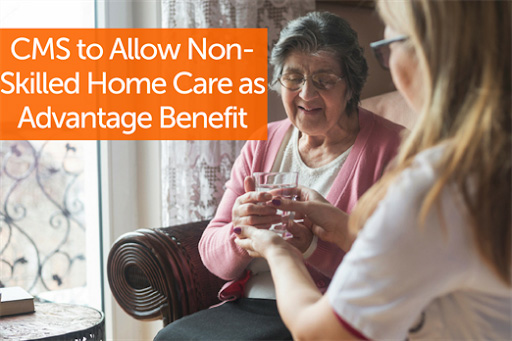We may be halfway thru the year, but CMS is already working on rules and changes to home health care policies for 2019. And while rule changes often bring concern in the industry, there is one rule change that is being almost universally welcomed.
On February 1, CMS announced a proposed rule change that would allow Medicare Advantage plans to offer benefits for private duty home care, including non-skilled in-home supports for daily maintenance and activities. This is a significant change, as previously services were not allowed to be offered as supplemental benefits if their primary purpose was for daily maintenance. In addition to these benefits, under the proposed rule MA plans would also be allowed to cover wheelchair ramps, assistive devices, and other modifications, which most people must pay for out-of-pocket now.
Adding these benefits to the Medicare Advantage plans also triggers an increase in Medicare payments to the plan providers, potentially increasing revenue by nearly 5 percent.
Explaining the New Rule
The proposed rule change is not so much a change, but a reinterpretation of an existing statute. Under the existing rules, any home health services must be health-related, which CMS has interpreted to mean that it’s not for daily maintenance activities. However, because assistance with these activities, including bathing, dressing, and other tasks, can reduce the likelihood of injury, diminish the impact of injury or illness, and help compensate for physical disabilities or health conditions, thereby reducing emergency room visits and hospitalizations — and subsequent costs — CMS has decided to take a second look at these services and redefine them as health related, and therefore eligible for coverage.
The expanded supplemental benefits could potentially benefit as many as 35 percent — or 19 million — Medicare beneficiaries who are currently enrolled in Medicare Advantage plans. While some of these beneficiaries are “dual eligible,” and have Medicaid and an MA plan, many are low income seniors who do not qualify for Medicaid or Medicaid home health benefits. Should these individuals require home health services, they generally have to pay out of pocket, or go without. The new rule interpretation will ostensibly remove this barrier, ensuring that those who have MA plans get the care they need.
What the Rule Means for Home Health
While some question whether the small (1.84 percent) increase in Medicare payments to MA plans will actually be enough to support the addition of this new benefit, overall, response to the proposal has been positive. The majority of home health providers support the proposal despite some questions on how it will actually play out.
Chief among the concerns of providers is whether MA plans will only cover non-skilled home health services from Medicare-certified home health agencies. Some experts predict, based on conversation with health care leaders and the information contained in the proposal, that MA’s will not require policy holders to use only Medicare-certified providers. However, the final rule on that remains to be seen.
Despite these concerns, home health agencies are excited about the potential that this change brings, and what it could mean for the future and how it will support home health agency growth. Some are speculating that this move could be signaling that Medicare will also soon begin covering non-skilled home care as well. It also signals a move to add more supplemental benefits to MA plans in the future. For now, though, many agencies are reaching out to their managed care partners to discuss this opportunity and what it could mean for them, and building relationships to take advantage of the change.
The final rule on the expansion of Medicare Advantage benefits is expected to be released in the first week of April. However, the chances of this proposal becoming reality are good.“Our priority is to ensure that our seniors have more choices and lower premiums in their Medicare health and drug plans,” said CMS Administrator Seema Verma. “We are focused on addressing the specific needs of beneficiaries and providing new flexibilities for Medicare Advantage plans to offer new health-related benefits. This is a big win for patients.”
For many agencies, CMS’ proposal to expand supplemental benefits is a win and a step in the right direction to help expand access to home health care. Although the new rules will not go into effect into 2019, now is the time to begin preparing for the changes and positioning your agency to make the most of this opportunity.
Discover more about how the Complia Health family of home health software can help your HHA do just that, while also increasing revenue and seamlessly managing all aspects of your business.




